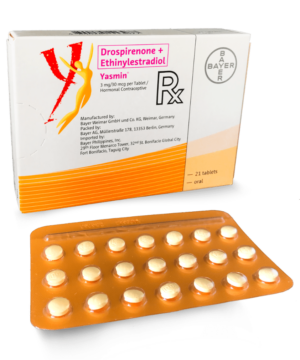

Novomix 30 Flexpen 100Iu/Ml5X3
₱477.26
IMPORTANT NOTICE: We require a doctor’s prescription for this product.? Don’t forget to attach a copy of your prescription (.jpeg, .pdf, or .png format) upon checkout, or email it to [email protected] with your order number! To confirm your order and validate your prescription, our pharmacist will be in touch after you place your order. For a smoother transaction upon delivery, please be ready to present the original copy of your prescription when claiming your order.
This medicine requires COLD STORAGE? and can only be purchased using Rose Express Delivery within Metro Cebu.
Novomix 30 Flexpen 100Iu/Ml5X3
GENERIC NAME: 100 U OF INSULIN DEGLUDEC/INSULIN ASPART IN THE RATION 70/30 (EQUIV TO INSULIN DEGLUDEC 2.56 MG, INSULIN ASPART 1.05 MG) (PER ML SOLN) 100 U/ML
Each mL of suspension for injection contains 100 units of soluble insulin aspart 30% and protamine crystallized insulin aspart 70% (equivalent to 3.5 mg).
Insulin aspart is produced by recombinant DNA technology in Saccharomyces cerevisiae.
One pre-filled pen contains 3 mL equivalent to 300 U.
Excipients/Inactive Ingredients: Glycerol, phenol, metacresol, zinc chloride, sodium chloride, disodium phosphate dihydrate, protamine sulfate, sodium hydroxide and hydrochloric acid (for pH adjustment) and water for injections.
This Item can not be shipped via LBC.
- Applicable for Metro Cebu order
- Credit Card, GCash, Maya, Bank Transfer and COD payment available
- Daily Operations - 8:00 AM to 6:00 PM
- Order Cut-off - 3:00 PM
- Free Shipping for 1,499 and above orders (Visayas & Mindanao)
- For Order below 1,499 delivery fee of 99.00 (less than 1 kilo) will be applied
- For Order below 1,499 delivery fee of 199.00 (1 -3 kilo) will be applied
- Credit Card, GCash, Maya and Bank Transfer payment available
- Description
- Additional information
- Reviews (0)
Description
Novomix 30 Flexpen 100Iu/Ml5X3
Description :
Each mL of suspension for injection contains 100 units of soluble insulin aspart 30% and protamine crystallized insulin aspart 70% (equivalent to 3.5 mg).
Insulin aspart is produced by recombinant DNA technology in Saccharomyces cerevisiae.
One pre-filled pen contains 3 mL equivalent to 300 U.
Excipients/Inactive Ingredients: Glycerol, phenol, metacresol, zinc chloride, sodium chloride, disodium phosphate dihydrate, protamine sulfate, sodium hydroxide and hydrochloric acid (for pH adjustment) and water for injections.
Indications / Uses :
Treatment of diabetes mellitus requiring insulin.
Administration :
Should be taken with food: Administer immediately before or soon after a meal.
Contraindications :
Hypersensitivity to biphasic insulin aspart or to any of the excipients of NovoMix 30 FlexPen.
Special Precautions :
Before traveling between different time zones, the patient should seek the doctor’s advice since this may mean that the patient has to take the insulin and meals at different times.
Hyperglycemia: Inadequate dosing or discontinuation of treatment, especially in type 1 diabetes, may lead to hyperglycemia and diabetic ketoacidosis. Usually the first symptoms of hyperglycemia develop gradually over a period of hours or days. They include thirst, increased frequency of urination, nausea, vomiting, drowsiness, flushed dry skin, dry mouth, loss of appetite as well as acetone odour of breath. In type 1 diabetes, untreated hyperglycemic events eventually lead to diabetic ketoacidosis, which is potentially lethal.
Hypoglycemia: Omission of a meal or unplanned, strenuous physical exercise may lead to hypoglycemia. Hypoglycemia may occur if the insulin dose is too high in relation to the insulin requirement (see Overdosage and Adverse Reactions). Compared with biphasic human insulin, biphasic insulin aspart 30 may have a more pronounced glucose lowering effect up to 6 hrs after injection. This may have to be compensated for in the individual patient, through adjustment of insulin dose and/or food intake.
Patients, whose blood glucose control is greatly improved eg, by intensified insulin therapy, may experience a change in their usual warning symptoms of hypoglycemia, and should be advised accordingly. Usual warning symptoms may disappear in patients with longstanding diabetes.
Tighter control of glucose levels can increase the potential for hypoglycemic episodes and therefore require special attention during dose intensification as outlined in Dosage & Administration.
Biphasic insulin aspart 30 should be administered in immediate relation to a meal. The rapid onset of action should therefore be considered in patients with concomitant diseases or treatment with other medicinal products where a delayed absorption of food might be expected.
Concomitant illness, especially infections, usually increases the patient’s insulin requirements.
Concomitant diseases of the kidney, liver or affecting the adrenal, pituitary or thyroid gland can require changes in the insulin dose. When patients are transferred between different types of insulin products, the early warning symptoms of hypoglycemia may change or become less pronounced than those experienced with their previous insulin.
Transfer from Other Insulin Products: Transferring a patient to a new type or brand of insulin should be done under strict medical supervision. Changes in strength, brand (manufacturer), type, origin (animal, human, human insulin analog), and/or method of manufacture may result in the need for a change in dosage.
Patients transferred to biphasic insulin aspart 30 from another type of insulin may require an increased number of daily injections or a change in dosage from that used with their usual insulin products. If an adjustment is needed, it may occur with the 1st dose or during the 1st few weeks or months.
Injection Site Reactions: As with any insulin therapy, injection site reactions may occur and include pain, redness, hives, inflammation, bruising, swelling and itching. Continuous rotation of the injection site within a given area reduces the risk of developing these reactions. Reactions usually resolve in a few days to a few weeks. On rare occasions, injection site reactions may require discontinuation of biphasic insulin aspart 30.
Combination of Thiazolidinediones and Insulin Medicinal Products: Cases of congestive heart failure have been reported when thiazolidinediones were used in combination with insulin, especially in patients with risk factors for development of congestive heart failure. This should be kept in mind if treatment with the combination of thiazolidinediones and insulin medicinal products is considered. If the combination is used, patients should be observed for signs and symptoms of congestive heart failure, weight gain and edema. Thiazolidinediones should be discontinued if any deterioration in cardiac symptoms occurs.
Insulin Antibodies: Insulin administration may cause insulin antibodies to form. In rare cases, the presence of such insulin antibodies may necessitate adjustment of the insulin dose in order to correct a tendency to hyper- or hypoglycemia.
Effects on the Ability to Drive or Operate Machinery: The patient’s ability to concentrate and react may be impaired as a result of hypoglycemia. This may constitute a risk in situations where these abilities are of special importance (eg, driving a car or operating machinery).
Patients should be advised to take precautions in order to avoid hypoglycemia while driving or operating a machine. This is particularly important in those who have reduced or absent awareness of the warning signs of hypoglycemia or have frequent episodes of hypoglycemia. The advisability of driving or operating the machine should be considered these circumstances.
Use in Pregnancy & Lactation: There is limited clinical experience with biphasic insulin aspart 30 in pregnancy. Biphasic insulin aspart 30 has not been investigated in pregnant women. However, data from 2 randomized, controlled clinical trials (157 and 14 insulin aspart-exposed pregnancies respectively, in basal-bolus regimen) do not indicate any adverse effect of insulin aspart on pregnancy or on the health of the fetus/newborn when compared to soluble human insulin (see Pharmacology: Pharmacodynamic under Actions).
In addition, the data from a clinical trial including 27 women with gestational diabetes randomized to treatment with insulin aspart vs soluble human insulin (insulin aspart: 14; soluble human insulin: 13) showed similar safety profiles between treatments.
In general, intensified blood glucose control and monitoring of pregnant women with diabetes are recommended throughout pregnancy and when contemplating pregnancy. Insulin requirements usually fall in the 1st trimester and increase subsequently during the 2nd and 3rd trimesters. After delivery, insulin requirements return rapidly to pre-pregnancy levels.
There are no restrictions on treatment with biphasic insulin aspart 30 during lactation. Insulin treatment of the breastfeeding mother presents no risk to the baby.
However, the biphasic insulin aspart 30 dosage, may need to be adjusted.
Additional information
| Weight | 10 kg |
|---|
Be the first to review “Novomix 30 Flexpen 100Iu/Ml5X3” Cancel reply
You must be logged in to post a review.

















Reviews
There are no reviews yet.